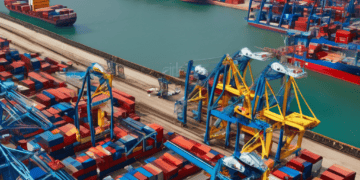In the modern era, the intricacies of global supply chains have become increasingly pronounced, with production processes undergoing significant transformation to maximize cost efficiency. This evolution has led to the emergence of international production networks, where stages of production are strategically positioned across various locations worldwide. These networks are predominantly composed of intermediate goods, including raw materials and semi-finished products, which are further processed and potentially sold as exports. Currently, intermediate goods constitute over two-thirds of global trade, highlighting the extensive nature of these supply chains.
However, the landscape of international production and trade has encountered notable challenges in recent times. The momentum of global production fragmentation has experienced a plateau, influenced by several pivotal events. The trade tensions between major economies, the disruptive impact of the COVID-19 pandemic, and geopolitical tensions have exerted pressure on global value chains, prompting a reevaluation of their sustainability and efficiency. This situation has sparked a scholarly debate on the potential reconfiguration of these chains and has become a focal point in policy discussions. A key concern is the strategic dependencies and autonomy of regions such as the Netherlands and the European Union, with an emphasis on minimizing vulnerabilities in supply chains to ensure reliability and resilience.
To address these concerns, policymakers have expressed a need for a detailed understanding of supply chain risks at a granular level. Traditional statistics on goods imports offer a superficial view of product-level dependencies but fail to capture the complete picture, particularly the indirect dependencies that are not immediately apparent. For instance, a Dutch automotive manufacturer might import lithium batteries from Germany, unaware that the lithium used in these batteries originates from Chile, thereby creating an indirect dependency on Chilean lithium.
Recognizing the limitations of conventional data, researchers have embarked on developing innovative methodologies to uncover these hidden dependencies at a product level. The CBS World Café event highlighted contributions from two notable experts in this field. Antoine Berthou, a Senior Economist at the OECD, introduced a groundbreaking study that utilizes product-level trade data combined with OECD Inter Country Input Output tables to map vulnerabilities within global value chains. This research offers vital insights for managing supply chain risks amidst various global challenges.
Simultaneously, Oscar Lemmers, a Senior Researcher at Statistics Netherlands (CBS), shared findings from a study on the supply chains of five Dutch industries. This research, which analyses commodities traded within these supply chains and their associated risks, aims to inform the Dutch Ministry of Economic Affairs and Climate Policy on potential vulnerabilities in critical supply chains.
The insights gained from these presentations underscore the importance of adopting a nuanced approach to understanding and mitigating risks in global supply chains. As the landscape of international trade continues to evolve, such research is invaluable for stakeholders looking to navigate the complexities of supply chain management effectively.
This comprehensive overview sheds light on the ever-evolving dynamics of global supply chains, emphasizing the necessity for strategic planning and risk management. As we navigate through the complexities of international trade and production, the insights provided by experts in the field serve as a guide for policymakers, businesses, and stakeholders committed to enhancing the resilience and sustainability of supply chains.
The exploration of indirect dependencies in supply chains highlights the interconnected nature of global trade, underscoring the importance of transparency and advanced analytics in identifying and mitigating potential risks. By leveraging granular data and innovative research methodologies, stakeholders can gain a deeper understanding of the vulnerabilities within their supply chains and develop strategies to address them.
As the global economy faces multiple challenges, from geopolitical tensions to environmental concerns, the role of supply chain management becomes increasingly critical. The discussions and findings presented at the CBS World Café event offer valuable perspectives for enhancing supply chain efficiency and sustainability, contributing to a more robust and resilient global trade environment.
In conclusion, the intricate web of global supply chains requires a meticulous and informed approach to navigate its complexities successfully. The ongoing research and discussions in this domain are pivotal in shaping the future of international trade and production, ensuring that supply chains can withstand the myriad of challenges they face in a rapidly changing world.
Explore the newest supply chain news at The Supply Chain Report. Visit ADAMftd.com for free international trade tools.
#TheSupplyChainReport #GlobalSupplyChains #RiskManagement #SupplyChainInnovation #GlobalTrade #EconomicAnalysis #StrategicDependencies #InternationalProduction #SupplyChainResilience #SupplyChainTransparency #DataAnalytics #EconomicPolicy #SustainableSupplyChains















